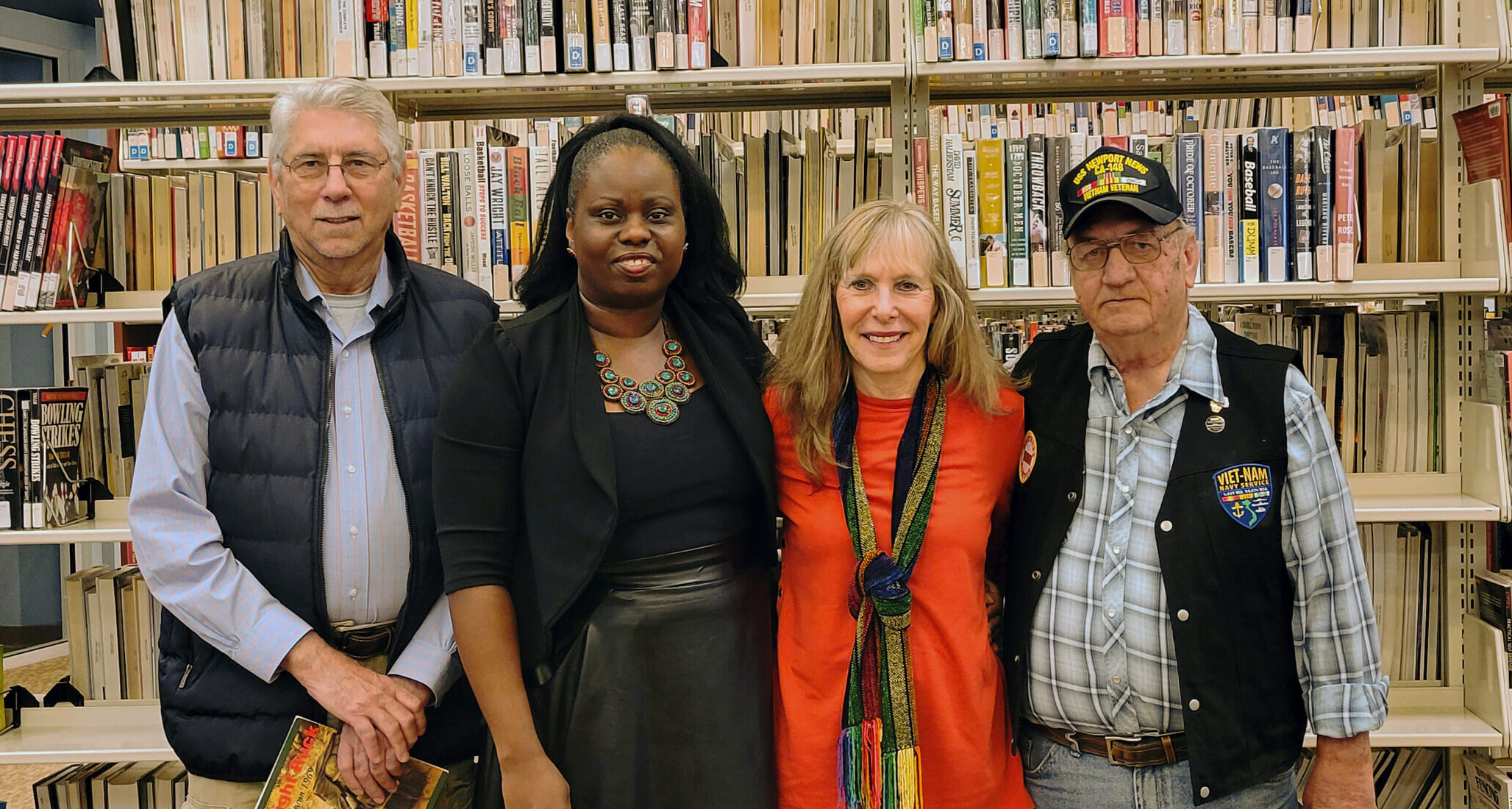By Jill Parker Landsman
Preserving firsthand recollections of veterans is crucial for honoring our United States veterans’ experiences and sacrifices. The NCRF Veterans History Project not only captures these stories, but also helps future generations gain insight into the realities of military service. NCRA Board Member Margary Rogers, RPR, CRI, took down the oral histories of two Vietnam veterans who shared their wartime experiences at the Samuel Library in Front Royal, Va., last December. Both men live in Warren County, Va.
The stories of Tom LaCombe and Milton Foster provide invaluable perspectives about wartime realities, challenges, courage, and resilience, ensuring that the lessons they learned and the sacrifices they made are not forgotten. It is a vital way to keep their legacies alive.
Vietnam vet Tom LaCombe shares stories of his time in the Army
LaCombe, drafted in 1968, entered Army basic training for four months at Ft. Bragg, and found himself on duty in Vietnam as an infantry soldier right after that. His words reflected the profound anxiety that many families felt during the Vietnam War. These personal reflections not only highlight the emotional toll on veterans and their families, but also provide important context for understanding the broader impact of the war. Sharing stories like LaCombe’s helps keep that history alive.
LaCombe said: “My family was worried. News came on and news about how many were killed in Vietnam. Did not look that things were going well. My father knew what was awaiting me.”
He said he followed orders, which helped improve his survival chances. “I was a good soldier in that way. I did what I was told,” he said. The necessity of following orders in a high-stakes environment like combat can be a matter of life and death. Learning to adapt and obey in the Army was crucial for survival, highlighting the intense pressures soldiers such as LaCombe faced.
LaCombe also mentioned the importance of letters from home, which provided emotional connection and support during tough times. His mention of resupply efforts, combined with the scarcity of water and food, highlighted the logistical challenges they endured. The struggle with conditions like jungle rot underscored the physical toll of constant heat, sweat, and inadequate hygiene, and yet it also reflected the resilience and camaraderie that developed among service members. He captures much of these experiences in his book Light Ruck: Vietnam 1969, available on Amazon.
His book writing was partially motivated by the memory and wartime experiences of a family member. “My great grandfather wrote about the civil war and his capture at the battle of Gainesville, where he was severely wounded. I always loved his story. [His grandfather’s] book tells of the misery that he lived through and reminded me of what I went through,” he said.
LaCombe’s recounting of one major experience highlighted the intense fear and camaraderie that defined combat. Climbing onto rooftops while on the lookout for snipers and mines illustrated the constant danger they faced. He said “…We were taking this hilltop, Ziggy and I were both wounded by mortars. Later in the day when we gained control of the hill, first sergeant yelled at me to get Ziggy, he was in a dust bomb.” Ziggy was wounded in combat, and LaCombe helped him aboard the helicopter that would take him for emergency medical treatment.
LaCombe said, “He died on that bird. Sigmund Sikorski was [Ziggy’s] name. He was from Ozone Park in NYC. Just a real nice guy.”
Although some soldiers struggled to adjust after returning home, LaCombe believes he adjusted well. He described a tense moment during patrol in a free-fire zone, where he and another soldier, Roger, were ordered to chase a man. When they caught up with him, they found him wielding a sword, shielding women and small children. The Army soldiers could have thrown grenades, which many soldiers did in similar situations, leading to tragic outcomes. LaCombe feels that choosing not to use grenades spared him from becoming a different, more traumatized person. “If I had thrown those grenades,” he said, “I would have been a totally different person. War gives the opportunity to do some horrible things.”
Milton Foster’s perspective on the Vietnam war as a Navy vet
Foster enlisted in the Navy when he turned 18, as his father, too, was a veteran who had served in the Army. Foster recalled that he was assigned to a Navy vessel, initially stationed in Rhode Island during a cold March for six months. He was then transferred to another destroyer, the USS Laffey, where he served for three months. When the USS Laffey was set to go to the shipyard, volunteers were sought for deployment to Vietnam. Feeling a personal need to go, he volunteered for the assignment.
Milton described his time aboard the USS Newport News during the Vietnam War, where his role was staffing a five-inch gun mount as part of a crew that conducted covert operations. His ship, nicknamed the “Grey Ghost from the East Coast,” participated in stealthy missions, striking targets before they could be detected. One of their missions took place north of the DMZ, alongside three other ships, targeting Haiphong Harbor, which became a major focus of bombing near the end of the war due to its strategic importance as North Vietnam’s only major port.
Milton recounted a dangerous encounter near Haiphong Harbor where three PT boats attacked their ship and its accompanying destroyers. His ship hit one PT boat, another destroyer took out a second, and a plane destroyed the third. After the mission, the captain praised the crew for their efforts during the intense situation. Though their ship was not hit in the battle, a later gunpowder malfunction on board caused an explosion on Oct. 1, 1972. It was in the number two turret of the USS Newport News, killing 20 crew members and exposing 36 crew to toxic gas, he shared.
“Couple of them passed away from the smoke,” he said, referring to his Navy comrades. “We transferred them to a bigger ship that had a bigger hospital. That malfunction, it was kind of hard. There was three to four days of solace. You did not hear a lot of joking around like you usually do.”
The USS Newport News was a heavy cruiser that served as the flagship of the United States Second Fleet for most of its career. The ship was decommissioned in 1975 and sold for scrap in 1993.
Regarding the news of the decommission of his former Naval home, he said, “It was a sad day. It was one beautiful and big ship; the USS Newport News was decommissioned. Everyone talks about how proud they were to serve on the Newport News.”
Milton emphasizes that his military service taught him the importance of respect. He recalled how officers treated recruits with respect from the start, creating a mutual sense of regard that contrasted with harsh depictions in movies. Milton believes everyone deserves respect and urges younger generations to consider military service as a way to learn respect, self-control, and other life skills. He also reflected on how attitudes toward Vietnam veterans have shifted: while veterans are now thanked for their service, they once faced hostility and disrespect from protestors during the war.
Serving in the military continues to be one of the proudest parts of his life. “Veterans are protecting our country,” he said. “They are doing in their heart what they feel they need to do.”
Veterans serve with remarkable dedication, often in the face of significant challenges and societal backlash. The stories of these two veterans — one from the Army, one from the Navy — highlight their selflessness and commitment to their country. Their willingness to endure hardships and serve in difficult circumstances exemplifies the courage and resilience required in military service.
Jill Parker Landsman, NCRF Manager, can be reached at jlandsman@ncra.org.










